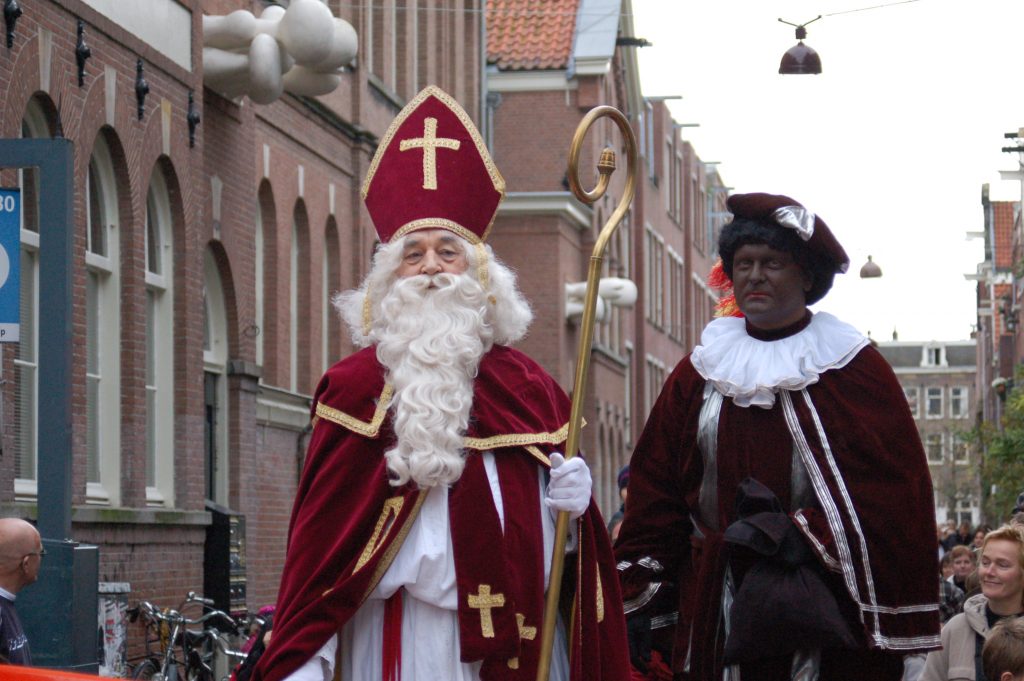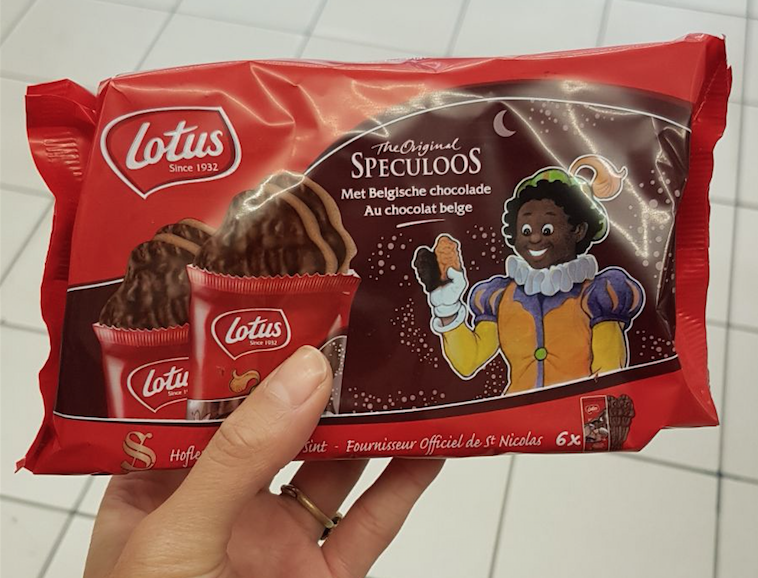
Seven years ago, I was guiding a group of tourists around Amsterdam. I took my usual route, a street which runs alongside Dam Square, a main street in the center of the city. I had forgotten that there would be a parade blocking the street that day, but I figured the tourists would be interested in experiencing traditional Dutch festivities as part of their holidays, so we paused in front of the parade. When I turned back and saw the shock and horror on my friends’ faces, I realised I’d – somehow! – forgotten about Zwarte Piet.
We were observing the parade known as the ”Sinterklaasintocht” – when St. Nicholas arrives in the Netherlands on a steamboat with his trusty horse, and his helper Zwarte Piet, or “Black Pete”. That day was the first of many incidents in which non-Dutch friends and acquaintances started coming to me with questions after being exposed to the phenomenon. These questions always carried the expectation that I, as a black woman from the Netherlands, could surely clarify and help them make sense of what they had just seen.
They wanted to know: was the Netherlands a violently racist country with a deep hatred of black people? Or was this all just some elaborate misunderstanding?
While either of these options could serve as more neat and convenient explanations, the truth is, unsurprisingly, much more complicated.
Over the last few years, I’ve been following the media coverage around Zwarte Piet and the comment section on many articles exploring the issue often encapsulate many aspects of Dutch ‘culture’ that I experienced while growing up there.
To me, there are a handful of recurrent themes in the comments that are illustrative of Dutch culture at large – these may help you understand how Zwarte Piet persists despite local and international criticism.
1. It’s not intended as racism, therefore it isn’t racism. Don’t be difficult. Act normal.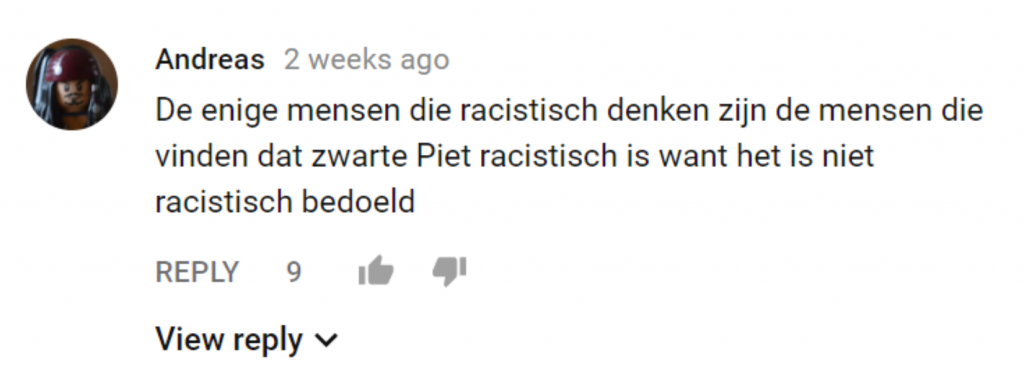
[Caption: “The only people who think in a racist manner are the people who think Zwarte Piet is racist, because it’s not meant to be racist”]
Many who celebrate Sinterklaas ignore the Afro wigs, the red lips and hoop earrings and say that Zwarte Piet is simply black from the soot of the chimney (even though the face-paint is often dark brown). Dutch people are very unexceptional in their belief that ‘true’ racism requires racist intentions. This is a line of thought that is expressed all over the world when defending many forms of discrimination – the idea that there’s no bigotry unless a person explicitly says “I am biased against [insert group of people] and am doing [insert racist act] because I hate them”.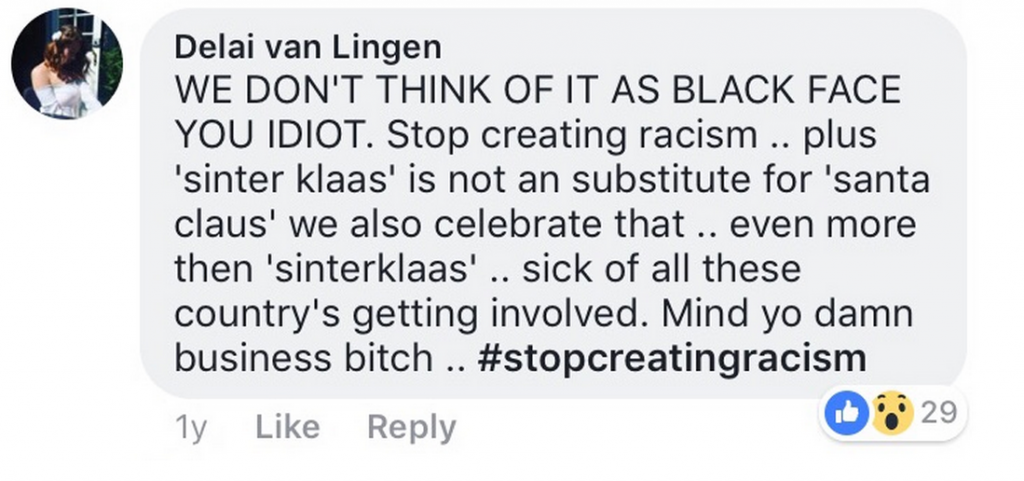 What is particularly insidious about racism in the Netherlands is that it often happens in the context of a culture that highly values assimilation. “Niet moeilijk doen” (not being difficult) and “normaal doen” (acting normal) are phrases that are frequently used in Dutch and are almost always used by blackface supporters.
What is particularly insidious about racism in the Netherlands is that it often happens in the context of a culture that highly values assimilation. “Niet moeilijk doen” (not being difficult) and “normaal doen” (acting normal) are phrases that are frequently used in Dutch and are almost always used by blackface supporters.
A saying I find illustrative of Dutch culture is: “Wie het hoofd boven het maaiveld uitsteekt, wordt zijn kop eraf gehakt” which translates to “he who sticks his head above the field gets his head chopped off”. In many ways, this is the opposite of American culture, where being exceptional is valued. In the Netherlands, however, you should not aspire to do too well, because assimilation is of the highest priority.
2. They’ve never heard of a racist incident and their “black friend” doesn’t complain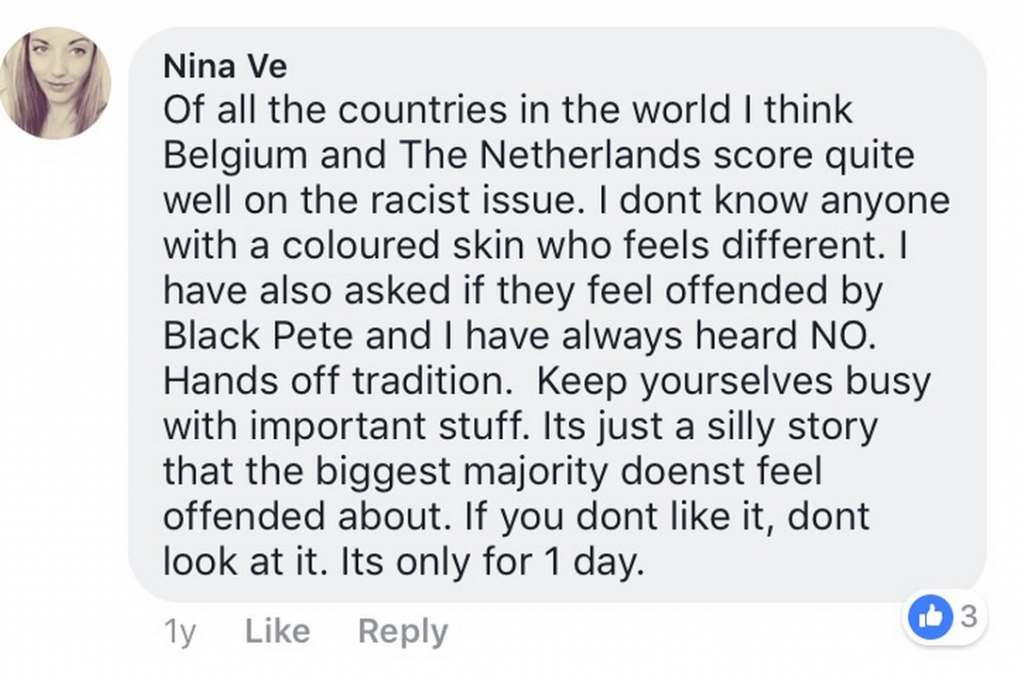
When I was thirteen years old, I remember a group of boys at school walking up to me and demanding to know if I was offended about the chocolate candies called “negerzoen”. The word “zoen” means “kiss” in Dutch and the word “neger” needs no translation. In 2005, companies selling these candies had recently decided to change the name of this product and, despite the fact that I had never even expressed an opinion on this subject, those boys held me personally responsible for having taken away their “negerzoen”. At that moment, I knew why they decided to walk up to the only black girl in a school of 1000 people, but I did not have the vocabulary, nor the courage, to describe the incident as racist.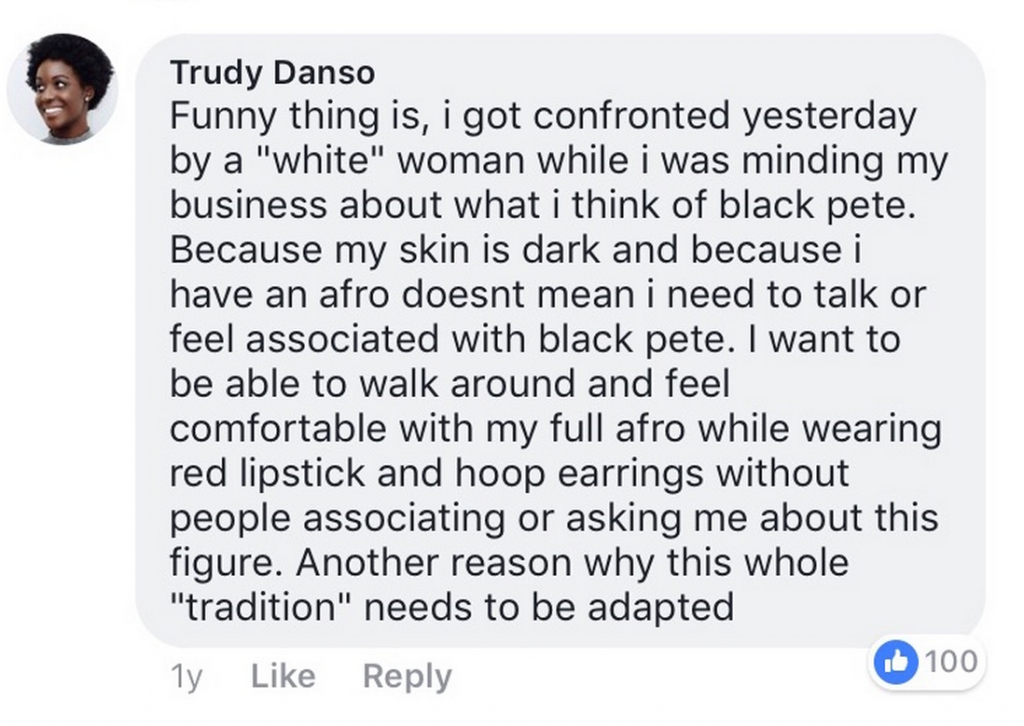
I sometimes wonder if those boys took my silence as evidence of me not having a problem with it. When I read comments by supporters of blackface saying that their “colored friends” (the irony is not lost) don’t have a problem with Zwarte Piet, I wonder if they ever genuinely bothered to look into the matter.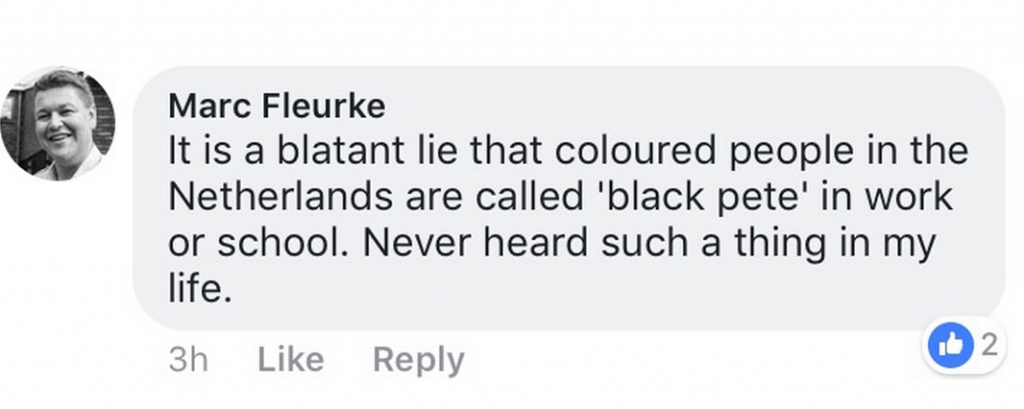 If they had bothered to do some basic Googling, they would see that beneath all the videos of black people complaining about Zwarte Piet, there is at least one comment calling them “zeurpiet” (complaining Piet). They would read that a few years ago, a show presenter got fired for calling his black female co-presenter a glorified Zwarte Piet. And if they were truly interested in seeing whether black people in the Netherlands had suffered any racism, they would not dismiss all the testimony given to that effect.
If they had bothered to do some basic Googling, they would see that beneath all the videos of black people complaining about Zwarte Piet, there is at least one comment calling them “zeurpiet” (complaining Piet). They would read that a few years ago, a show presenter got fired for calling his black female co-presenter a glorified Zwarte Piet. And if they were truly interested in seeing whether black people in the Netherlands had suffered any racism, they would not dismiss all the testimony given to that effect.
3. Other places are worse, so don’t criticise the Netherlands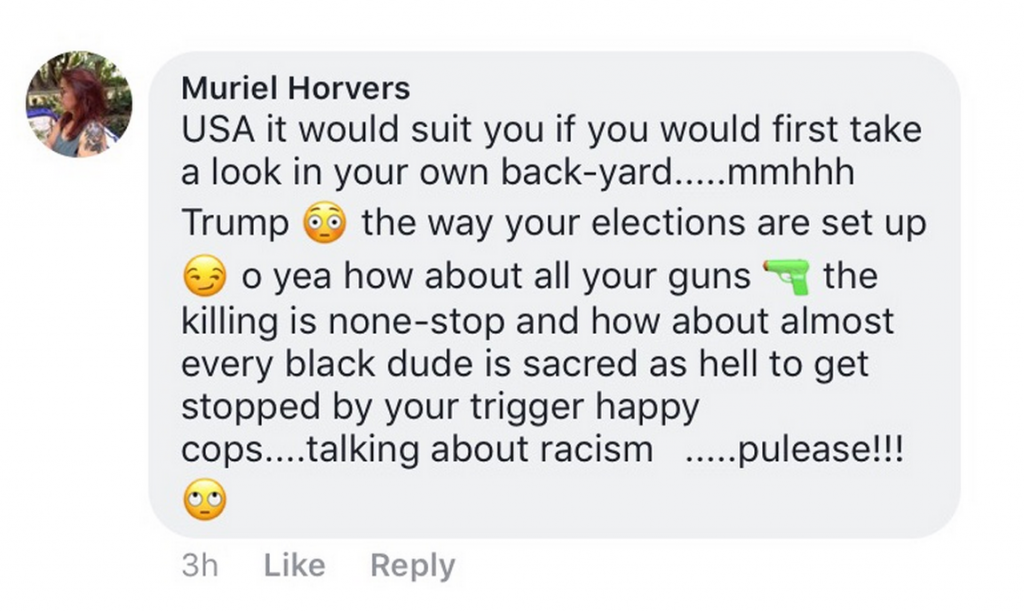 In my 3rd year of secondary school, I remember two boys who liked to chant to me “Alle Juden mussen tot” (all Jews must die). I’m not Jewish, but I understood why they chanted it to me. They thought it was funny how scared I looked when they would do a Nazi salute and yell “sieg heil” or when they would sing slave songs at me that we’d listened to during music class.
In my 3rd year of secondary school, I remember two boys who liked to chant to me “Alle Juden mussen tot” (all Jews must die). I’m not Jewish, but I understood why they chanted it to me. They thought it was funny how scared I looked when they would do a Nazi salute and yell “sieg heil” or when they would sing slave songs at me that we’d listened to during music class.
I loved history class and I remember all the things we learnt about in Dutch history. But I can now also see what was missing. For all the focus on the “Golden Age”, very little was said about the Netherlands’ role in the slave trade. And when it came to World War II, we learnt about Nazi Germany and the Dutch resistance, but there was little emphasis on how Dutch collaborators with the Nazis may have contributed to Jewish people in the Netherlands having one of the lowest survival rates during the Holocaust.
In international media on Zwarte Piet, Dutch people will frequently comment that other places are worse (especially America), therefore, these people cannot give any criticism. But this idea that other places are worse, is driven by an ignorance of Dutch history, as well as wilful ignorance of examples of racism.
4. If you don’t like it leave the country (black people aren’t really Dutch)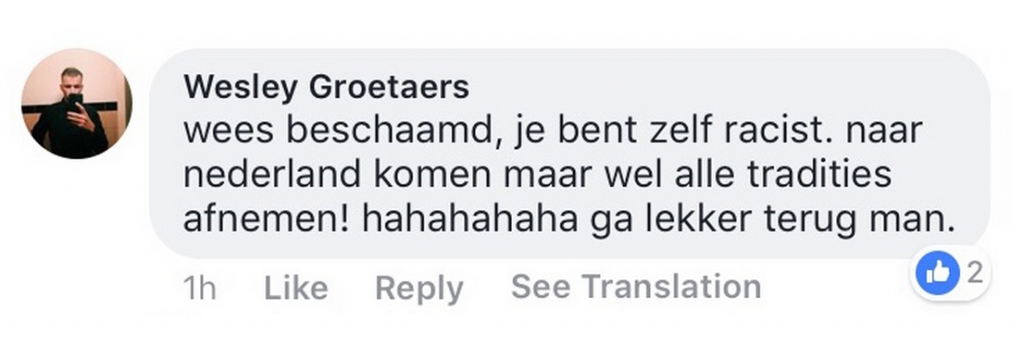 [Caption: “Be ashamed, you are racist yourself. Going to the Netherlands, but taking away all the traditions! Hahaha, go back, man.”]
[Caption: “Be ashamed, you are racist yourself. Going to the Netherlands, but taking away all the traditions! Hahaha, go back, man.”]
Ultimately, the dismissal of black Dutch opinions on Zwarte Piet is about power. Specifically, the power of ‘real’ Dutch people to dictate what Dutch culture is and who has a valid say in it.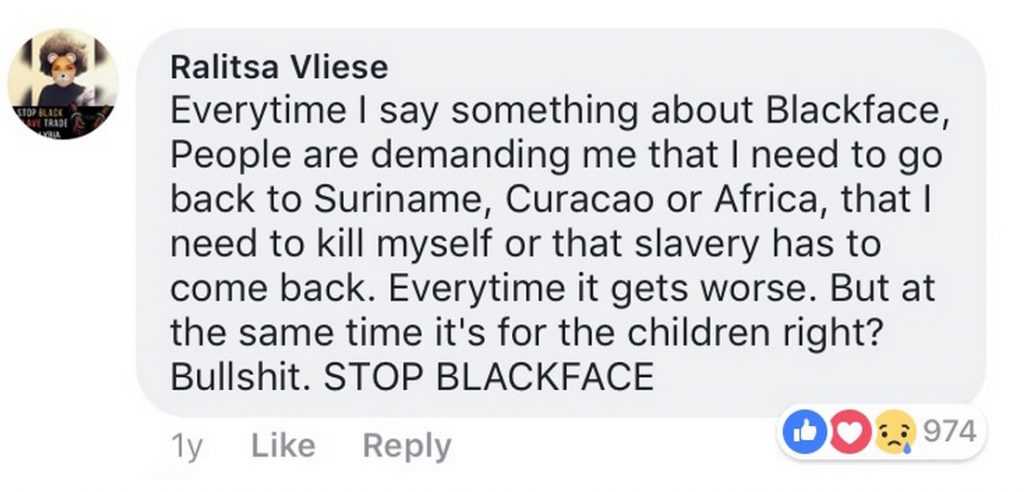 It’s difficult to truly become Dutch. The word “allochtoon” is used to distinguish Dutch citizens whose parents or grandparents were born in a foreign country. The word literally means “of foreign origin”. In its institutionalized sense, it includes any Dutch citizen with at least one parent born abroad. This would make a large number of Dutch citizens with German and Flemish heritage “allochtoon”, including King Willem Alexander. However, unsurprisingly, this term is more specifically used to distinguish “non-Western” foreigners.
It’s difficult to truly become Dutch. The word “allochtoon” is used to distinguish Dutch citizens whose parents or grandparents were born in a foreign country. The word literally means “of foreign origin”. In its institutionalized sense, it includes any Dutch citizen with at least one parent born abroad. This would make a large number of Dutch citizens with German and Flemish heritage “allochtoon”, including King Willem Alexander. However, unsurprisingly, this term is more specifically used to distinguish “non-Western” foreigners.
To be allochtoon and to be Dutch is to have a permanent label of your Otherness. It is to be almost, but not quite Dutch. It is to be a second-rate citizen, whose opinions are of a lower priority than those of a ‘real’ Dutch person.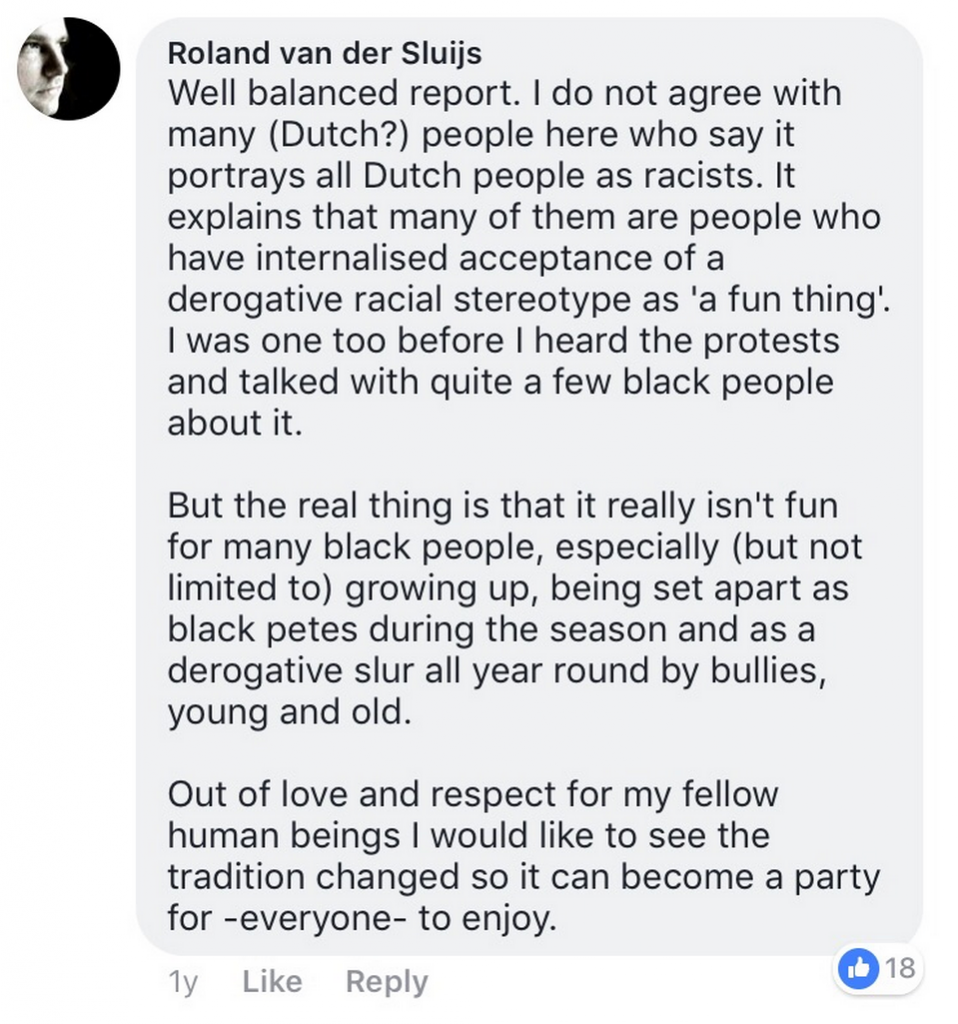 In spite of this context, with the incredible work and dedication of protesters such as Jerry Afriyie and Anousha Nzume, the organisations Zwarte Piet Is Racisme and Nederland Wordt Beter (the Netherlands is getting better), public opinion has been changing and there has been international attention to the issue pushing Amsterdam and other big towns to remove blackface from their official celebrations. This work will continue, and until blackface becomes a thing of the past. Dutch people themselves – in particular those whose bodies are less targeted by state and police brutality – must step up and take action to delegitimise and eradicate Zwarte Piet.
In spite of this context, with the incredible work and dedication of protesters such as Jerry Afriyie and Anousha Nzume, the organisations Zwarte Piet Is Racisme and Nederland Wordt Beter (the Netherlands is getting better), public opinion has been changing and there has been international attention to the issue pushing Amsterdam and other big towns to remove blackface from their official celebrations. This work will continue, and until blackface becomes a thing of the past. Dutch people themselves – in particular those whose bodies are less targeted by state and police brutality – must step up and take action to delegitimise and eradicate Zwarte Piet.

Britain’s policing was built on racism. Abolition is unavoidable

How Pakistan’s Khwaja Sira and transgender communities are fearing and fighting for their futures

Their anti-rape performance went viral globally. Now what?


